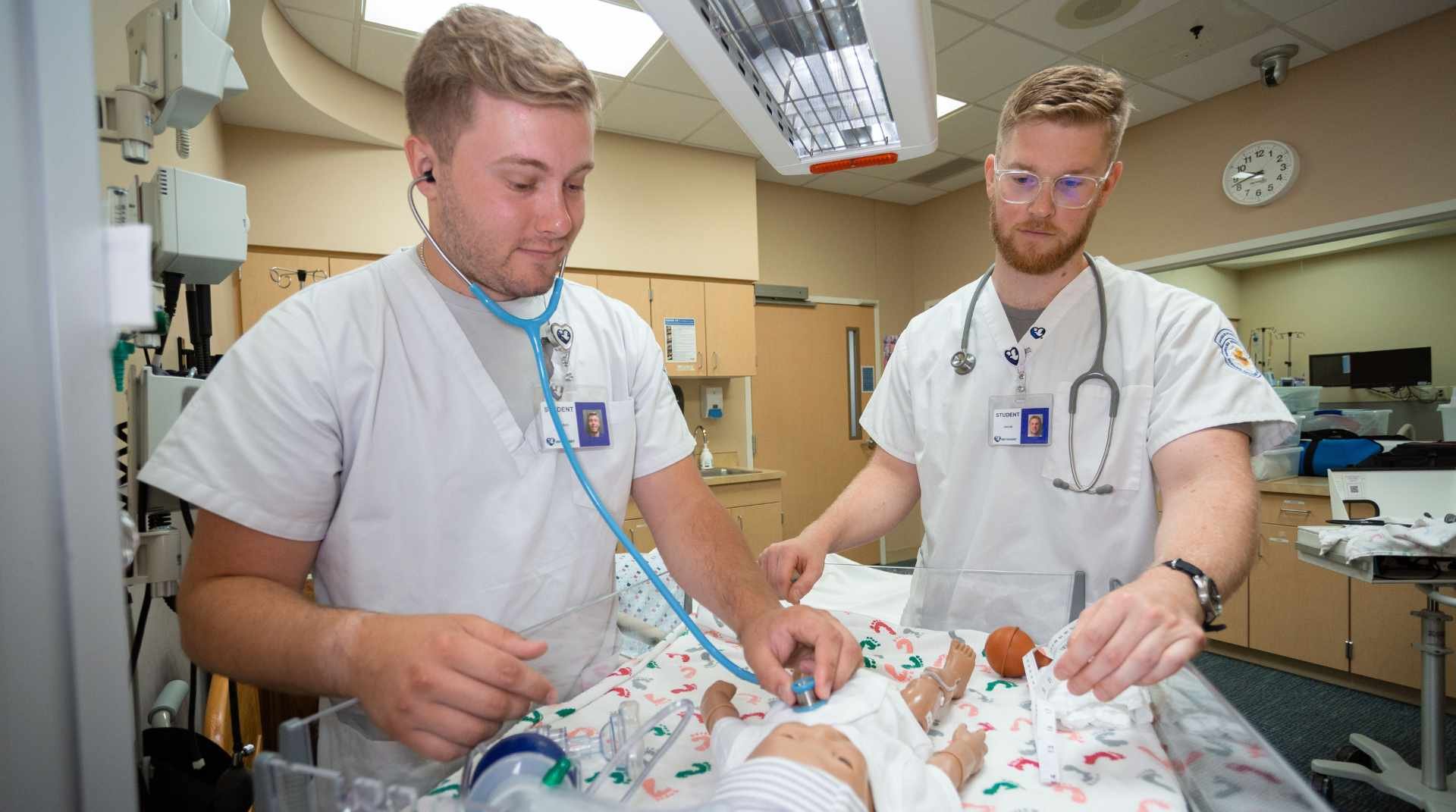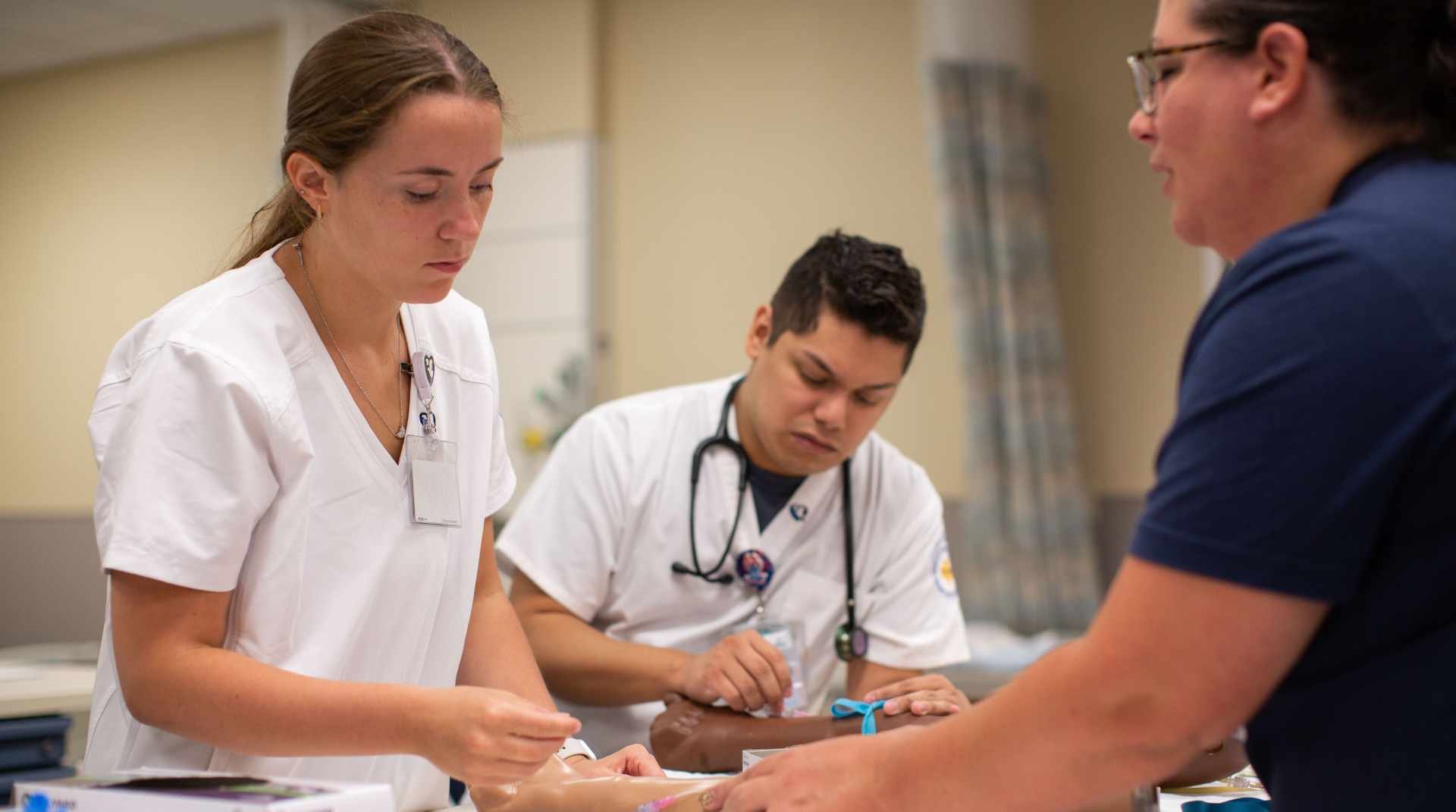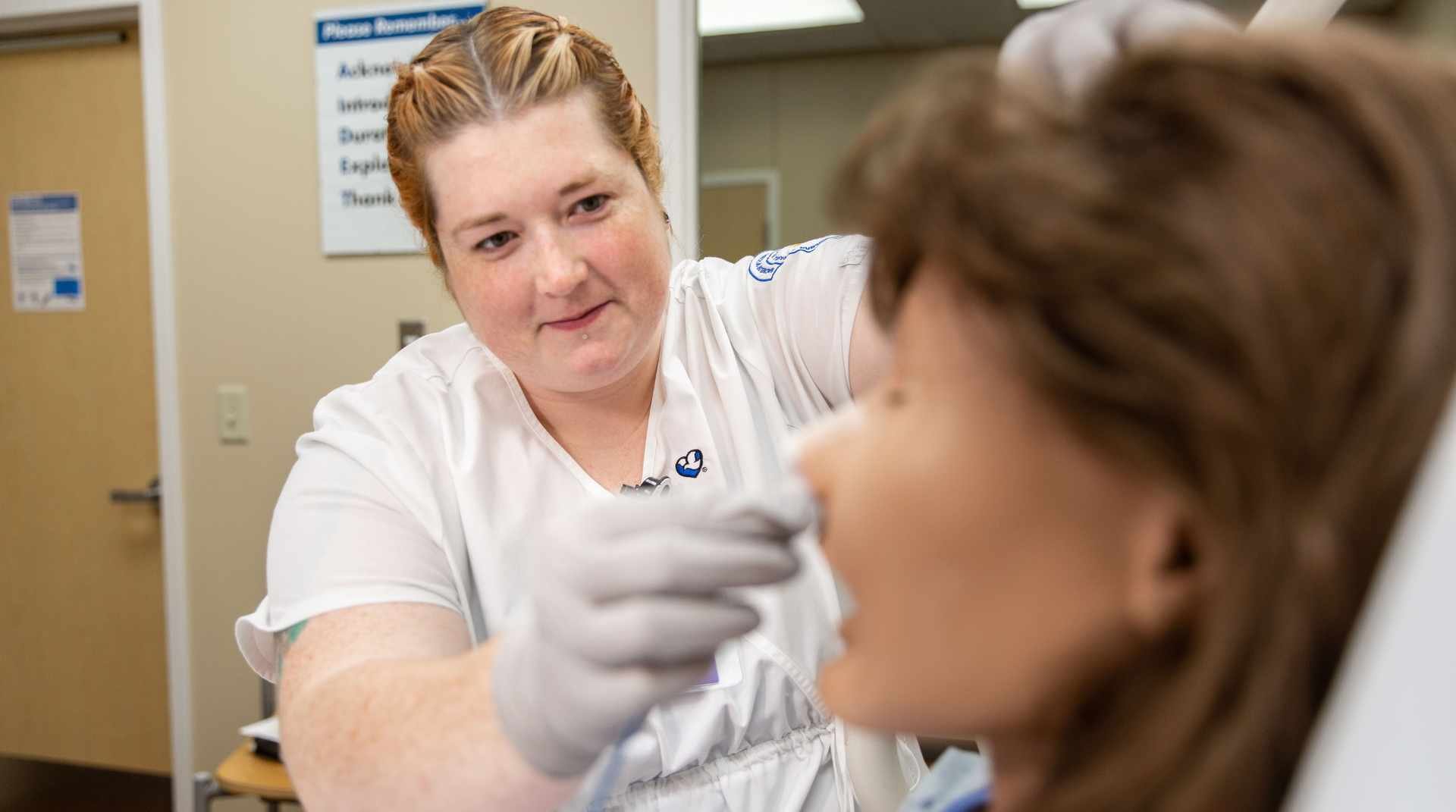 There is no better time to become a nurse, and getting your Bachelor of Science in Nursing in an accelerated program can fast track your nursing education.
There is no better time to become a nurse, and getting your Bachelor of Science in Nursing in an accelerated program can fast track your nursing education.
If you want to have a rewarding career and make a difference in people’s lives, transitioning to a career in nursing may be right for you.
Transitioning to a Career in Nursing with an Accelerated BSN
During an Accelerated Bachelor of Science in Nursing (ABSN), students develop the skills they need for nursing success.
Graduates of the program are prepared to take the National Council Licensure Examination (NCLEX), which is required for nurses in the United States.
Nurses are in demand with a projected growth of six percent from 2022 to 2032, according to the U.S. Bureau of Labor Statistics. The job growth for nurses is faster than the average for all occupations.
Understanding the Accelerated BSN Pathway
Many nursing schools will offer a Bachelor of Science in Nursing that has two pathways: traditional and accelerated.
At Nebraska Methodist College (NMC), students can pursue a BSN through either of these programs.
The traditional BSN program takes four years to complete and students can begin the program after high school or as a transfer student without completed degrees.
During a four-year program, students can expect to have more free time and be able to manage a part-time job.
The accelerated program is 12 months and for those who already have a non-nursing associate or bachelor’s degree.
Some of the ABSN program benefits are:
- A cohort system that ensures camaraderie and support during the program.
- Tailored academic assistance.
- Access to state-of-the-art labs and comprehensive clinical experiences.
- Knowledgeable and supportive faculty.
In both the traditional and accelerated nursing programs, students at NMC typically receive one of their top three choices for preceptorships.
ABSN eligibility criteria and prerequisites are:
- Completion of prerequisite courses prior to August enrollment (use NMC’s Prerequisite Guide under “Criteria” on the ABSN program webpage).
- Having earned an associate or bachelor’s degree from a regionally accredited institution.
- A minimum cumulative GPA of 2.75.
- Success in previous math and science coursework.
- Ability to meet the technical standards of nursing practice.
Whichever nursing education pathway is right for you, know that in each program you’ll have support through academic coaching, counseling, study groups, test preparation groups and peer-to-peer tutoring.
Read more: Traditional vs. Accelerated BSN: Which is Right for You?
Tailoring Previous Education for ABSN Success
If you already have an associate or bachelor’s degree, your previous education will be a benefit during your accelerated BSN experience.
You’ll have the discipline required to study and complete assignments on time. You’ll also have study skills that will help you succeed in the program.
Fast-Track Learning in ABSN Programs
Students in the ABSN program should prepare to devote hours comparable to a full-time job for the 12 months of the program.
The program requires a minimum of 142 credit hours, including prerequisite courses and program hours.
Classes students take include Population-based Health, Professionalism in Nursing, Introduction to Pharmacology, Healthcare Policy, Language and Culture in Healthcare, Nursing Care of Specialized Populations and Transition to Practice.
 Benefits of Choosing an Accelerated BSN for Career Change
Benefits of Choosing an Accelerated BSN for Career Change
For those interested in a quick nursing career transition, the accelerated BSN program has many benefits.
The advantages of an accelerated nursing program include:
- A short time commitment.
- An intensive learning experience.
- Support from faculty.
- Close connection with peers.
- Developing career readiness skills.
- Starting a career quickly.
Career Opportunities Post-ABSN Graduation
After you receive your BSN, you’ll be prepared to work as a registered nurse in various settings.
Registered nurses can work at:
- Hospitals.
- Physician’s offices.
- Schools.
- Surgery centers.
- Oncology clinics.
- Home healthcare companies.
- Nursing care facilities.
- Government agencies.
- Aesthetic clinics.
- In the military.
As a nurse, you can find an area of practice that you feel passionate about. You may want to explore your areas of interest during your clinicals or preceptorship while you’re in college.
Networking and Professional Growth in ABSN Programs
As you’re on your career path to nursing, you’ll have many opportunities for networking and professional growth.
In addition to clinical experiences and a preceptorship, NMC students can attend networking and professional development events on campus.
An annual event brings together Methodist Health System clinical leaders with students nearing graduation.
Career counseling is also available to students who need assistance with resume writing, job searching and more.

Overcoming Challenges in Accelerated Nursing Education
An accelerated BSN degree requires a significant time commitment with attending classes, studying course materials and participating in clinical experiences.
The most common challenges students face in an ABSN program include the rigorous coursework, the time commitment and balancing classes with personal responsibilities.
“Students who have completed an associate or bachelor’s degree understand the commitment that goes into completing rigorous coursework,” said Jillian Krumbach, director of undergraduate nursing at NMC. “I think it’s important for students to be prepared for the time commitment that comes with an accelerated program. This program is not only fast-paced, but has challenging content and demanding clinical experiences. A student must be prepared to adjust their life around the program.”
Staying organized and building a support network are keys to success, Krumbach said.
“Organization is key in managing content and schedules in this program,” she said. “Students should find a system to organize all the priorities they will be expected to maintain.”
Krumbach also suggested building connections to manage the coursework in the accelerated program.
“Students need to form connections with other students. This helps students in many ways, including feeling understood, forming study groups and forming community,” she said.
Balancing Life and Intensive Study in an ABSN
Managing stress and practicing self-care will support your emotional and mental health, and help you academically.
Stress management and self-care practices for busy nursing students include:
- Get enough sleep.
- Eat nourishing foods.
- Move your body.
- Spend time outside.
- Take study breaks.
- Meditate.
- Spend time with friends and family.
- Schedule time for your hobbies.
- Schedule appointments with a counselor.
- Utilize student support services.
Students at NMC have access to free, confidential counseling services and student support services that can assist with work-life balance in a BSN program.
Accessing Support Systems and Resources
During your accelerated nursing program, it will be imperative to utilize the support systems available to you.
Academic support services help students have success in the classroom, and encourage personal and professional growth.
At NMC, student academic support services are:
- Academic coaching.
- Tutoring.
- Writing support.
- Supplemental instruction.
- Mentoring.
- Technology support.
Building a personal support network with peers, faculty and mentors will also help you find success during your ABSN program.
Read more: Balancing Life, Work and an Accelerated BSN Program
The Role of Clinical Experience in ABSN Programs
To gain hands-on experience, nursing students have the opportunity to participate in clinicals.
ABSN clinical training helps students learn critical thinking skills, watch experienced nurses in action and put their classroom skills into practice.
Because of clinicals, nursing students are more prepared for their career as a registered nurse.
Navigating the ABSN Admissions Process
Before you apply to an accelerated nursing program, you’ll want to meet with an admissions coordinator.
They will discuss requirements and criteria for admission, and help you determine if you have the right transfer credits.
If you schedule an in-person meeting with an admissions coordinator, you’ll get a tour of campus. At NMC, you’ll visit the Nursing Arts Center where you’ll tour simulation labs and nursing classrooms.
Read more: 7 Tips for a Successful NursingCAS Application
Looking Ahead: The Future of Nursing with ABSN Graduates
Accelerated BSN graduates are shaping the future of nursing.
“NMC graduates are different. We teach the meaning of care and our graduates leave here more prepared to provide holistic, respectful care,” Krumbach said. “The ABSN program is a family. The students and faculty form unique bonds and move together through a rigorous 12 months. Students feel supported and truly cared for by faculty.”
Ready to embark on your nursing journey? Explore our Accelerated BSN program to jumpstart your nursing career. Contact us now for more information and take your first step towards a rewarding future in healthcare!